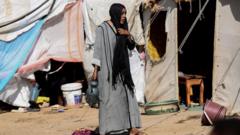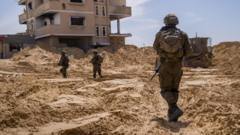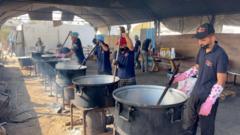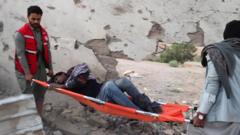In a significant escalation, paramilitary forces have struck Port Sudan with drone attacks, marking a dangerous new chapter in Sudan’s ongoing civil war. Hundreds of thousands of displaced civilians are now at heightened risk as clashes continue to ravage the country.
Paramilitary Forces Target Port Sudan in New Escalation of Civil Conflict

Paramilitary Forces Target Port Sudan in New Escalation of Civil Conflict
The Rapid Support Forces launch drone strikes on Port Sudan, intensifying the two-year conflict and leaving civilians in peril.
In a shocking development, the paramilitary Rapid Support Forces (RSF) have launched drone attacks on Port Sudan, marking the first time the city has been targeted since the outbreak of a civil war two years ago. According to the Sudanese army, the RSF utilized "suicide drones" to strike at the Osman Digna Air Base and nearby civilian facilities, leading to limited damage but no reported injuries.
The RSF's assault on Port Sudan represents a severe escalation in ongoing hostilities that erupted in April 2023 between the RSF, a powerful paramilitary group, and the Sudanese Armed Forces (SAF). Under the leadership of General Mohamed Hamdan Dagalo, known as Hemedti, the RSF has primarily focused on controlling regions in Darfur and southern Sudan. Meanwhile, Port Sudan has remained a relative safe haven, harboring both UN agencies and refugees fleeing the relentless violence that has left at least 150,000 dead and millions displaced.
Sunday's drone strikes have paralyzed air travel in Port Sudan, as authorities reported that the airport has been closed, with all flights suspended. Eyewitness accounts described scenes of chaos at the airport following the attacks, including reports of explosions and billowing smoke, though these claims are yet to be independently verified.
Prior to these strikes, Port Sudan remained one of the few places in Sudan spared from direct conflict. Following the SAF’s loss of the capital, Khartoum, which transformed into a battleground, the coastal city became the de facto headquarters for Sudan's military-led government under General Abdel Fattah al-Burhan. As the conflict progresses, international efforts to establish a ceasefire continue to falter, with both the RSF and SAF backed by foreign powers escalating their arms buildups.
With the war now entering its third year, the repercussions are felt far beyond the battlefield. The ongoing humanitarian crisis in Sudan has severely impacted over 30 million people, many facing acute food shortages and starvation. As tensions rise and divisions deepen, the prospect of peace remains increasingly elusive.
The RSF's assault on Port Sudan represents a severe escalation in ongoing hostilities that erupted in April 2023 between the RSF, a powerful paramilitary group, and the Sudanese Armed Forces (SAF). Under the leadership of General Mohamed Hamdan Dagalo, known as Hemedti, the RSF has primarily focused on controlling regions in Darfur and southern Sudan. Meanwhile, Port Sudan has remained a relative safe haven, harboring both UN agencies and refugees fleeing the relentless violence that has left at least 150,000 dead and millions displaced.
Sunday's drone strikes have paralyzed air travel in Port Sudan, as authorities reported that the airport has been closed, with all flights suspended. Eyewitness accounts described scenes of chaos at the airport following the attacks, including reports of explosions and billowing smoke, though these claims are yet to be independently verified.
Prior to these strikes, Port Sudan remained one of the few places in Sudan spared from direct conflict. Following the SAF’s loss of the capital, Khartoum, which transformed into a battleground, the coastal city became the de facto headquarters for Sudan's military-led government under General Abdel Fattah al-Burhan. As the conflict progresses, international efforts to establish a ceasefire continue to falter, with both the RSF and SAF backed by foreign powers escalating their arms buildups.
With the war now entering its third year, the repercussions are felt far beyond the battlefield. The ongoing humanitarian crisis in Sudan has severely impacted over 30 million people, many facing acute food shortages and starvation. As tensions rise and divisions deepen, the prospect of peace remains increasingly elusive.





















